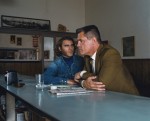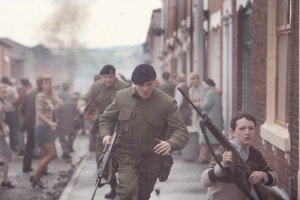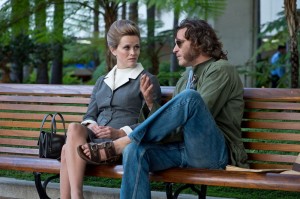AFI Fest, the longest-running international film festival in Los Angeles, has taken off at Hollywood Boulevard. Over the next week, directors from around the world, including new auteurs and renowned award-winners, will be making appearances at the TCL Chinese Theater, the Egyptian Theater and the Dolby Theatre to support their newest projects, with numerous awaiting fans in tow.
A&E; senior staff Sebastian Torrelio and A&E; contributor Tony Huang will be attending AFI Fest this week, scoping out the newest selections on the festival circuit, and films that may be coming to American audiences in the near future. On the second day of AFI Fest coverage, Torrelio saw four movies that were heavily driven by their impressive actors, as well as one of the most hilarious films of the year.
“’71”
Directed by Yann Demange
Roadside Attractions
With performances in this year’s “Starred Up,” “Unbroken” and now gritty war drama “‘71,” Jack O’Connell appears to be the rising star of 2014. As British soldier Gary Hook, O’Connell goes through a terribly shocking experience on one particular day of “the Troubles,” a Northern Ireland conflict between nationalists and unionists. His fleet is sent out to control the city of Belfast when riots break out, leaving him stranded and his compatriot dead. Director Yann Demange follows O’Connell with a shaky camera as Gary runs for his life through the dimly lit, always haunting, streets of Belfast.
The remainder of Gary’s day remains bloody and unsettling as he is hunted by a group of Irish goons trying to oust him before his unit can find him. “’71” presents the behind-enemy-lines moments of war with a justifiable haze, leaving characters’ motivations mysterious. As Gary continues to be shot at and chased throughout his impressively harrowing night, “’71” can’t help but feel predictable, the ultimate fate of each of its personalities, good or evil, shining through their rough skin. Still, with a no-holds barred performance by O’Connell and a heftily sustained tension throughout, Demange makes the best of his premise, giving insight into how war films of the future may stand.
“Gett: The Trial of Viviane Amsalem”
Directed by Ronit Elkabetz and Shlomi Elkabetz
Music Box Films
“Gett: The Trial of Viviane Amsalem” is a tale of struggle unlike most seen at the festival. Entirely composed within a courtroom, “Gett” follows actress – and co-director – Ronit Elkabetz as Viviane Amsalem, the frustrated wife to Elisha Amsalem (Simon Abkarian), as she tries to divorce her husband over the course of five years. Unfortunately, the only courtroom in Israel that will see her is the Rabbinical court, which is very male-centric. “Gett” comments on both religion and political bodies with a strong sense of heartbreak and gripping drama that only gets more and more aggravating as Viviane is ignored by all of her peers.
Directed by brother and sister Shlomi and Ronit Elkabetz, “Gett” reaches above its bottled environmental limits with a strong sense of black humor. Each new character introduction is painful in appearance – Viviane must bring in consistently stranger friends and acquaintances to testify for her. But the Elkabetz siblings lighten the mood with fun personalities and impressive monologues. Ronit Elkabetz’s performance as Viviane remains the film’s most rousing element, vocally passionate at times, but burning with a look of indignation that won’t leave the viewers minds for days to come.
“Inherent Vice”
Directed by Paul Thomas Anderson
Warner Bros.
Presented in grainy 35mm print, “Inherent Vice” is definitely director Paul Thomas Anderson’s most absurd movie to date. In some ways, it is also one of his most immediately likeable – accessible enough to pander to a blockbuster crowd, rich enough in storytelling and cocaine-fueled atmosphere to seduce all of Anderson’s loyal fans all over again. It’s no wonder that Anderson was able to convince known reclusive author Thomas Pynchon to let him direct Pynchon’s first film adaptation, and Anderson surely delivers the goods.
What’s less important in “Inherent Vice” is the plot – the tale of private investigator Doc Sportello (Joaquin Phoenix) in a drug-riddled 1970s Los Angeles. Phoenix is in nearly every scene of the movie, sporting mutton-chops with a dazed and confused glossiness in his eyes. With each new character he runs into – played by such a diverse cast as Reese Witherspoon, Benicio del Toro and Martin Short – each receiving their short, though shining moments, Doc’s journey turns even more deranged and even more fanatical. Josh Brolin as “Bigfoot” Bjornsen is easily the most ridiculous – Brolin delivers a performance that’s on the verge of insanity. In this way, “Inherent Vice” seems alien, the mutterings of an extremely adept director over a well-acted narrative of lunacy. In presentation, though, “Inherent Vice” will be a controversial picture – tied together with a stark, old-fashioned cinematography and a brilliantly retro soundtrack to create the most hilarious movie of the year, and a mind-numbingly preposterous view into a crazy, psychedelic era.
“Two Days, One Night”
Directed by Jean-Pierre Dardenne and Luc Dardenne
Sundance Selects
Like many of the Dardenne brothers’ directing efforts, such as “The Kid with a Bike,” “Two Days, One Night” is all too real and all too striking. “Two Days, One Night” has the always powerful performance of Marion Cotillard to back it up too. Cotillard plays Sandra, a wife who is on the verge of losing her job – her co-workers have voted against her in favor of a 1,000-euro bonus. Due to behind-the-scenes corruption and bias, however, Sandra gets another chance, a secret ballot to be performed after the weekend for which she must receive a majority vote. Sandra and her husband (Fabrizio Rongione) put it upon themselves to visit each of Sandra’s co-workers to convince them to forgo their raises and allow her to stay.
Each new character in “Two Days, One Night” comes across as repetitive in concept, but compelling interesting in presentation. But the Dardennes put a fun spin on each additional face, giving them a purpose and a background with Sandra. Some of them are stern, some are sorrowful, some are gleeful – all of them are visibly human. The distress in “Two Days, One Night” looms heavily over Sandra as she questions her own purpose and determination, lending a feeling of loneliness to a story blooming with characters. The Dardennes create a compelling study of monetary issues and emotional struggles that, bolstered by Cotillard’s assurance as an actor, feels like a truly universal story.
– Sebastian Torrelio




